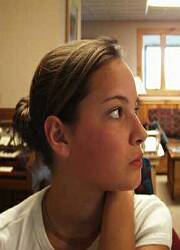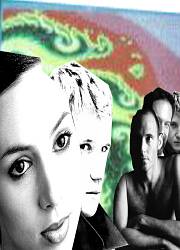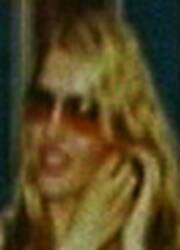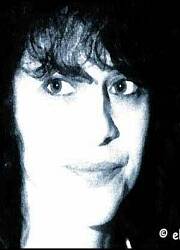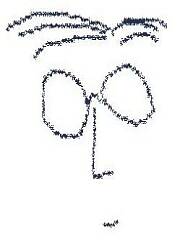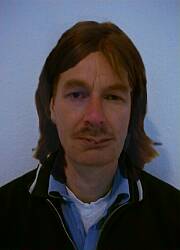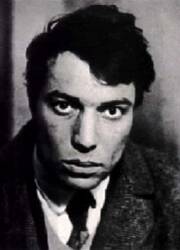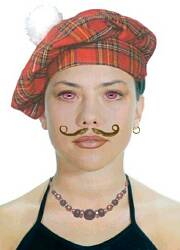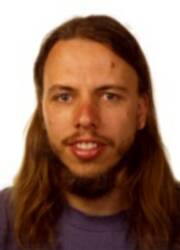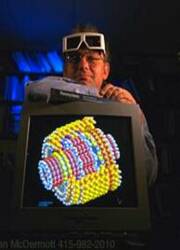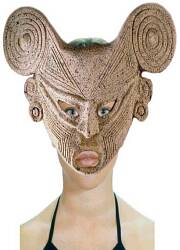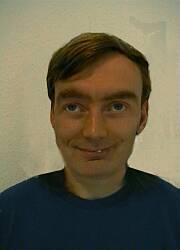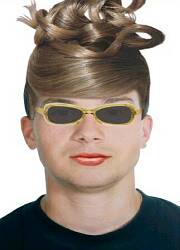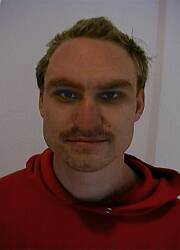| WELCOMING
SPEECH (Instead of a foreword) This years ...BALTIC BIENNIAL has no theme, just an age limit. This might sound offensive for a lot of old guys out there, but it is indeed our concept and the context that we seek. Has not youth always had an understanding of its own uniqueness, beyond the order of the old? This is why we must not dare to impose our old definitions upon a young generation. Similarly we must consider the possibilities of a very young space
like Hamburgs brandnew Kunsthalle I.N.U.I.T.. This space wants to avoid to be -like all the other spaces around- those enclaves of ye olde century. This space wants to house a free spirit Everything can happen here, everything shall happen here! There is nothing more to say! An old age must die and our contemporary youth is tomorrows generation! |
||||
|
|
||||
|
A short guide...
|
||||
|
|
||||
|
Ritlinka Dressing shows one fine example of her "A 1000 Islands" project. It is based on her childhood memories of deprivation in the former Soviet Union. She dreams her escape from the everyday, her refuge is an island of sweets. The population of her sweet dream is carved out of food, candy and marshmellows. With an artistic background in the performing arts we will see her throughout the exhibition eat away her very own island.
In her teens Ritlinka Dressing moved from White Russia to St Petersburg where she worked as an assistant to Mitralov Basulszki. Previously and for more than 10 years she had worked as a dietician with the surviving victims of Chernobyl. This is her first solo exhibition in Germany. |
||||
|
|
||||
|
AMIGA is an artists group from Riga, Lithuania. They are holding a paper workshop in a tent in the park. Everyone is welcomed to join! The tent was knitted from shopping bags by senior citizens in Riga and as a matter of exchange AMIGA will assemble a huge collage together with 16-year old students from the Paula Moderson Gymasium, Worpswede. It will show a cityscape of Hamburg composed of consumer items and fashion advertisements.
AMIGA is a collective of 7- 12 artists based in Riga with a collaborating department in Berlin. They have done various interventions in Geilo, Tallin, Vilnius and Costa Rica. |
||||
|
|
||||
|
Ilona Trumps partnership with a German heavy weight curator is an important resource for her artmaking. Her work is thoroughly staged and of necessary grandness. One of her famous work was 'Tres Chic!', a series of comissions in New York, were she put carpets in the streets between her clients penthouse and Saks 5th Avenue. Her contribution to the Biennial is the 'Golden Retriever Club', Europes first Dog Rental agency where the dear pets serve as accessories for every outfit and occasion.
Ilona Trump was born in Talin. After her 16th birthday she ran away from her Job at McDonalds and moved to NY in order "to have access to superstars". She got no professional art education but she developed her social skills in running a chain of pedicure saloons and a model agency. |
||||
|
|
||||
|
Polly Blond is showing three large fotographs in the LISA MAIN gallery. Her project is called "BIO-TI-FOOL" and she depicts the pain and torture that women undertake in order to make themselves beautiful. Fragile bodies advertise the vanity of a world of beauty and decay.
Polly Blond was born in South Africa, a small town in the centre of Sweden. She used to work as a kiddy-model for "Brio", "Cubus" and "Åhlens". In the age of 15 she was running her first hybrid art/fashion magazine called "Fritzing". |
||||
|
|
||||
|
Doris Jelzin is a dedicated supporter and a loud speaking promoter of subcultures of any kind, especially the noble art of skate boarding. We have commissioned a casted Bronx from her to be permanently installed at the museum entrance. Her piece is a celebration of and a reflection upon the rage amongst the contemporary youth. Her record 'Die Gefahr im HipHop' is available at the museum store.
She was born under a rock and raised on wolves. And this happened in 27.10.1965 in Szczecin in Poland in the middle of the night. |
||||
|
|
||||
|
Since the glamorous Monumenta in 1998 Edvard Krieg has been touring Europe with his banner installation in order to discuss the fashionable temporality of artistic radicalism. 'Edvard Krieg' is a constructed identity, a label to hide an unknown amount of gender benders appearing disguised at press conferences with mud-masks.
Further data not available. |
||||
|
|
||||
|
Piroger Snuff is one of the most impressive graffiti artists from Finland. In May 2000 he has sprayed all the subways stations in Turku with religios motives. His goal is to initiate all people into his system of new archaic symbols. These symbols should exorcize subversive ghosts from the people themselves. He was commissioned to paint the I.N.U.I.T. subway station to bring the ghosts out and the people in.
Piroger Snuff was born in Turku Finland. In the eighties he traveled to all the archaic places of the Maya, Inca and Aztec empires. There he discovered that he is Aztec by incarnation. |
||||
|
|
||||
|
David Hockey-BlueLainen
is interested in games and sports
as an artificial setup to playfully negotiate our struggels in real
life. That is why he sees the artworld as a game of different scenes,
all within one structure.
David Hockey-BlueLainen lives and works in Helsinki and Las Vegas. He is an honorary member of the NHL because he donated half of the LOTTO Jackpot which he hit in 1993 when he was only 13 years old. |
||||
|
|
||||
|
Mikhailev Buffer Kaliningrad
RUS
Mikhailev Buffer was born on a kolkhoz in Usbekistan before his parents moved to Kaliningrad. He has no formal art education and had been working in a company for ready-to-assemble furniture before he decided to become an artist. |
||||
|
|
||||
|
Idi Emin has made huge wall paintings inside of the museum that are reflecting on the architecture of the museum in particular, but of the international art scene in general. She has populated her painting with portraits of well known international curators and their girlfriends. An interesting aspect of her painterly technique is the use of pigment and mothers milk. Her expressionist style is merely a quote from the 1980's, just to make clear that we have to focus on the conceptual side of her work, which is in fact, institutional critique.
Idi Emin was born in Solingen in 1978. She moved to Rostock-Lichtenhagen after the infamous attacks on asylum seekers. Here she had several shows and performances in the clubhouse "Zum Weissen Würfel", but she makes her living as the weather(woo)man for "TV Rostock" |
||||
|
|
||||
|
Munchey Edvardsen takes the idea of the situationist "derive" back from where it came from: the abuse of alcohol! He makes imaginary maps from beer bottles and cigarette stumpes that he finds on his odyssey through nocturnal cityscapes. It is here where he weaves his ornamental narratives from trauma to delirium. But dispite the phantastic elements his prose is as cutting and precise as the grafics that he distills from the labels of beer bottles. He uses them like an alphabetic system or an international code flag signal.
Before Munchey Edvardsen discovered the writings of Debord and his favourite drink, he was an intern in the Otto Muehl commune and a piano entertainer under the name of Bulloy Oleson. In order to finance his expensive obsessions Munchey Edvardsen sold the Edvard Munch paintings that he had inherited from his father Edvard Meyer-Munch to the Eduard Munchy Museum in Osloy. He lives in Bergen and works in the blue container behind the museum (when he finds it). |
||||
|
|
||||
|
60o N Kapp Falaffel (The Käse brothers, Kasper, Jesper and Jonathan) from Legoland Danmark confront archaic nomadism with high technology in order to create self-sustained and inter-ethnic environments. A travelling lifestyle has had an early impact on the Käse brothers. Their Igloo is connected with a sattelite-link-up to a candystore in New Yorks upper East Side and powered by a treadmill. Only through the participating audience the communication with the art-capital will take effect.
The Käse Brothers were born in Legoland (Kasper in 1967, Jesper in 1977 and Jonathan in 1982) and they divide their time between Århus and Berlin. |
||||
|
|
||||
|
Fritjof Nonsense is an artist who deals with time as a concept. His drawings "killing time" are attempts to materialise the long empty hours between breakfast and supper. His tedious and precise lines create abstract patterns like woodgrain. But each line is in fact a cul-de-sac since they are all spirals. In the Baltic Bienniale he shows a Zeppelin with one of his drawings attached as a banner. Accoding to Nonsense the Zeppelin is a vast and empty structure, much like life it self. Circling over the gallery area the art piece serves as the reminder of life death and the sea.
Born in Volsmose outside of Odense, Danmark, Nonsense moved to Reykjavik at an early age in order to study "Oceanography". He soon lost interest in the studies and started to make doodels in his notebook instead. He calls his art career a "coincidental opportunity" because he was discovered by the wellknown curator Gutnarr Caravaran. |
||||
|
|
||||
|
Leva Liive's attitude towards the arts is deeply rooted in her outgoing personality and her sense of humour. She calls herself "Jack of all trades" and publishes her own column of jokes in 'Tattler' and 'Hello'. Her large collection of oven mittens was recently on display in the Moderna Museet in Stockholm. For the Biennale she has designed a large sculpture of siamese twins made out of dressing material, wire and tape. The twins were obviously lost on a protest march in favour of the actress Winona Ryder, who got recently arrested for stealing luxury items in a shopping mall in Beverly Hills.
Leva Liive lives in Vilnius, LIT. She was born on 1st of April 1977. She has a dog called 'cat' and her friend has a cat named 'Pluto'. This cat has a friend called Tanja Plairwitsch and her favourite dish is Leon di Caprio. |
||||
|
|
||||
|
Ola Motor-Ericsson has installed a bar and exhibition space in the caravans behind the Museum. In addition to his engagement fusing the arts with the social he experiments with a distillery in order to create perfectly self sustained cycles. His philosophy is to turn everything into energy: The waste from his distillery is used as fuel to illuminate the museum.
Ola Motor-Ericsson was born as the 11th child in a family of coleminers in Kiruna, in the North of Sweden. His father lost his job when young Ola set fire on the headframe by coincidence. He has studied art history in Malmö with Trude Blumquist and improved the heating system of the art academy recently by using all the canteen leftovers to warm the house. |
||||
|
|
||||
|
Due to her physical appearance Bitten
Tei has dedicated herself to the world of small things.
Bitten Tei lives in Aarhus, Danmark. She loves the city so much that she has never left it, except of once, when she was blown away by a whirlwind. After her nurse died of asthma she took a vow to never talk to a human again. |
||||
|
|
||||
|
Zigmarek Polka was born an raised in Gdansk. It was here where he attended the art academy but after graduation he discovered the difficulties of surviving as an artist. As a result he took a parttime job in Dolkander Kindergarden. Here he developed an interest for playground constructions, and that has been apparent in his artwork ever since. His work kann be seen in Warzwa, Milano and Bucarest and it became a well known element in European public cityscapes. His installation for the Biennial has previously been shown in Berlin Mitte.The sculpture is to be seen as a playground (for children) and a contemplative artpiece (for their mothers) hence incorporating the art into playful family context.
|
||||
|
|
||||
|
André van Dalen
is highly interested in the skills
and the secret traditions of the old masters. He studied the technique
of all the Dutch painters from Rembrand to Mondrian. He spent one
year digging in Hemsedal, Norway which is famous for its unique Ochre.
|
||||
|
|
||||






